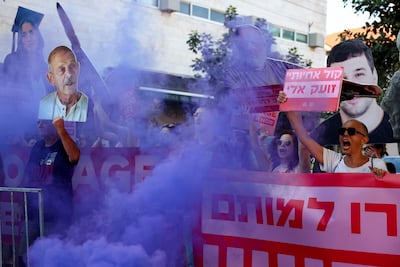Live updates: Follow the latest on Israel-Gaza
Gaza ceasefire talks got off to a "promising start" in Doha, the White House said on Thursday, despite Hamas staying away from the negotiating table over accusations Israel had added new demands to US proposals.
National Security Council spokesman John Kirby said the talks were a significant step and were expected to continue throughout Friday, with considerable work remaining.
“Today, we are focused on the details of the implementation of the agreement,” Mr Kirby said.
“There remains a lot of work to do. Given the complexity of the agreement, we do not anticipate coming out of these talks today with the deal. So, today is a promising start.”
The talks in Qatar are bringing together CIA director William Burns, the spy chiefs of Israel and Egypt, as well as the Qatari Prime Minister Sheikh Mohammed bin Abdulrahman Al Thani.
Sources told The National that Hamas could return to negotiations early next week on condition that the mediators from the US, Egypt and Qatar present a plan of action based on proposals announced by US President Joe Biden.
“The negotiations will primarily focus on narrowing the differences between Israel and Hamas,” said one of the sources.
“But Israel's insistence on eradicating Hamas and removing it entirely from the scene in Gaza after the war will always cast doubt on the fate of the talks.”
The talks are taking place as the Palestinian death toll in the Gaza war surpassed 40,000 and the prospect of a wider Middle East conflict is looming close after the assassination of Hamas's political leader Ismail Haniyeh in Tehran and senior Hezbollah commander Fouad Shukr in Beirut at the end of last month.
A ceasefire in Gaza after more than months of war would likely calm tensions across the region, and could persuade Iran and Hezbollah in Lebanon to back off from threats to retaliate against Israel over the assassinations.
"We obviously are watching this very, very closely," Mr Kirby said. "We have been messaging Iran through our counterparts and through people that have direct diplomatic relations with Iran."
"In addition to all that intense diplomacy, we've also made moves with defence capabilities – ships, aircraft, other military capabilities – to make sure that should Iran choose to go forward with some sort of an attack, that we're ready for it to defend ourselves, our facilities, our people, but also to defend Israel," he said.
The war has also displaced the vast majority of Gaza's 2.3 million residents and laid to waste large swathes of residential areas.
Israel claimed responsibility for the Beirut assassination and is widely presumed to be behind the one in Tehran. Both Iran and Hezbollah have vowed to avenge the two men, but Iranian officials have suggested Tehran could abandon plans to retaliate for Mr Haniyeh's assassination if a Gaza ceasefire is reached.

The mediators have spent months unsuccessfully trying to get Hamas and Israel to agree to President Biden's three-phase plan in which Hamas would release scores of hostages captured in its October 7 attack on southern Israel in exchange for a ceasefire, the withdrawal of Israeli forces from Gaza and the release of Palestinians imprisoned by Israel.
Both sides have agreed in principle to the plan, but Hamas has proposed “amendments” and Israel has suggested “clarifications”, leading them to accuse each other of making new and unacceptable demands.
Hamas has rejected Israel's latest demands, which include a lasting military presence along the border with Egypt and a line bisecting Gaza where it would vet Palestinians returning to their homes to root out suspected militants.
Prime Minister Benjamin Netanyahu denied Israel has made new demands, but has also repeatedly raised questions over whether the ceasefire would last, saying Israel remains committed to “total victory” against Hamas and the release of all the hostages.
The two sides are also divided over the details of the hostage-prisoner exchange, including who among the Palestinian prisoners would be eligible for release and whether they would be sent into exile. Hamas is demanding the release of high-profile militants convicted of orchestrating attacks that killed Israelis.
Hamas's October attack on southern Israel killed about 1,200 people. Another 240 were taken hostage, of whom about 100 were freed during a week-long truce in late November. Israel says about 111 remain in captivity, with the Israeli military contending that nearly 40 of them have died.

